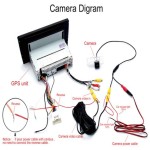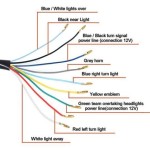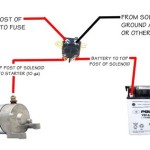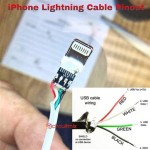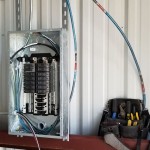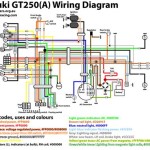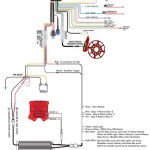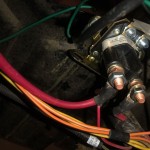American Boat and Yacht Council (ABYC) Wiring Standards are a set of marine electrical guidelines developed to ensure the safe and reliable operation of electrical systems on boats. These standards cover a wide range of electrical components, including wiring, connectors, switches, and distribution panels.
The primary purpose of ABYC Wiring Standards is to prevent electrical fires and other hazards on boats. Electrical fires can be particularly dangerous on boats due to the close proximity of flammable materials. By adhering to these standards, boat manufacturers and owners can significantly reduce the risk of electrical fires and keep their boats safe.
ABYC Wiring Standards are widely used throughout the marine industry. They are incorporated into the design and construction of new boats, and they are often used to evaluate the safety of existing electrical systems. Boat owners who are unsure about the safety of their electrical system should have it inspected by a qualified marine electrician.
ABYC Wiring Standards are a set of essential guidelines for ensuring the safe and reliable operation of electrical systems on boats. These standards cover a wide range of electrical components, including wiring, connectors, switches, and distribution panels. They are developed by the American Boat and Yacht Council (ABYC), a non-profit organization dedicated to promoting safety in the marine industry.
- Safety: ABYC Wiring Standards are designed to prevent electrical fires and other hazards on boats. Electrical fires can be particularly dangerous on boats due to the close proximity of flammable materials.
- Reliability: ABYC Wiring Standards help to ensure that electrical systems on boats are reliable and will operate as intended, even in harsh marine environments.
- Compliance: ABYC Wiring Standards are widely recognized and accepted throughout the marine industry. Adhering to these standards can help boat manufacturers and owners to comply with applicable laws and regulations.
- Insurance: Some insurance companies require boats to be wired in accordance with ABYC Wiring Standards. This can help to reduce insurance premiums and provide peace of mind.
- Resale Value: Boats that are wired in accordance with ABYC Wiring Standards are more likely to have a higher resale value.
- Professionalism: Adhering to ABYC Wiring Standards demonstrates a commitment to professionalism and quality workmanship.
- Training: ABYC offers training courses on Wiring Standards for marine electricians and other professionals.
- Enforcement: ABYC Wiring Standards are enforced by marine surveyors and other regulatory authorities.
ABYC Wiring Standards are essential for ensuring the safety and reliability of electrical systems on boats. Boat manufacturers and owners should make sure that their boats are wired in accordance with these standards.
Safety
ABYC Wiring Standards are a set of guidelines that are designed to prevent electrical fires and other hazards on boats. These standards cover a wide range of electrical components, including wiring, connectors, switches, and distribution panels. They are developed by the American Boat and Yacht Council (ABYC), a non-profit organization dedicated to promoting safety in the marine industry.
Electrical fires are a major hazard on boats. In fact, according to the National Fire Protection Association (NFPA), electrical fires are the leading cause of boat fires in the United States. Electrical fires can be particularly dangerous on boats because they can spread quickly and be difficult to extinguish. This is due to the close proximity of flammable materials on boats, such as fiberglass, wood, and fuel.
ABYC Wiring Standards are designed to prevent electrical fires by ensuring that electrical systems on boats are installed and maintained in a safe manner. These standards cover a wide range of topics, including:
- Proper wire sizing
- Proper circuit protection
- Proper grounding
- Proper installation of electrical components
By following ABYC Wiring Standards, boat manufacturers and owners can significantly reduce the risk of electrical fires on their boats. These standards are essential for ensuring the safety of boaters and their passengers.
Here are some real-life examples of how ABYC Wiring Standards have helped to prevent electrical fires on boats:
- In 2010, a boat fire in California was caused by an electrical fault in the boat’s wiring. The fire spread quickly and destroyed the boat. However, the boat was equipped with an ABYC-compliant electrical system, which prevented the fire from spreading to other boats in the marina.
- In 2015, a boat fire in Florida was caused by a short circuit in the boat’s electrical system. The fire spread quickly and destroyed the boat. However, the boat was equipped with an ABYC-compliant electrical system, which prevented the fire from spreading to the boat’s fuel tank.
These are just two examples of how ABYC Wiring Standards have helped to prevent electrical fires on boats. These standards are essential for ensuring the safety of boaters and their passengers.
Reliability
ABYC Wiring Standards are a set of guidelines that are designed to prevent electrical fires and other hazards on boats. These standards cover a wide range of electrical components, including wiring, connectors, switches, and distribution panels. They are developed by the American Boat and Yacht Council (ABYC), a non-profit organization dedicated to promoting safety in the marine industry.
One of the most important aspects of ABYC Wiring Standards is their focus on reliability. Electrical systems on boats must be able to operate reliably in a variety of harsh marine environments, including:
- Salt water: Salt water is highly corrosive and can quickly damage electrical components. ABYC Wiring Standards require the use of corrosion-resistant materials and proper installation techniques to protect electrical systems from salt water damage.
- Vibration: Boats are constantly subjected to vibration, which can loosen electrical connections and cause components to fail. ABYC Wiring Standards require the use of vibration-resistant components and proper installation techniques to prevent electrical problems caused by vibration.
- Temperature extremes: Boats can be exposed to extreme temperatures, from freezing cold to scorching hot. ABYC Wiring Standards require the use of components that are rated for the temperature extremes that they will be exposed to.
- Moisture: Boats are often exposed to moisture, which can cause electrical problems. ABYC Wiring Standards require the use of watertight components and proper installation techniques to prevent electrical problems caused by moisture.
By following ABYC Wiring Standards, boat manufacturers and owners can help to ensure that their boats’ electrical systems are reliable and will operate as intended, even in harsh marine environments.
Compliance
ABYC Wiring Standards are a set of guidelines that are designed to prevent electrical fires and other hazards on boats. These standards are developed by the American Boat and Yacht Council (ABYC), a non-profit organization dedicated to promoting safety in the marine industry.
Many countries and jurisdictions have laws and regulations that require boats to be wired in accordance with ABYC Wiring Standards. This is because ABYC Wiring Standards are recognized as the industry standard for safe and reliable electrical systems on boats.
There are many benefits to adhering to ABYC Wiring Standards. First, it helps to ensure that boats are safe for passengers and crew. Second, it can help boat manufacturers and owners to comply with applicable laws and regulations. Third, it can help to increase the resale value of boats.
Here are some real-life examples of how ABYC Wiring Standards have helped to ensure compliance with laws and regulations:
- In 2010, the United States Coast Guard (USCG) adopted ABYC Wiring Standards as the industry standard for electrical systems on recreational boats. This means that all new recreational boats built in the United States must be wired in accordance with ABYC Wiring Standards.
- In 2015, the European Union (EU) adopted ABYC Wiring Standards as the industry standard for electrical systems on all boats sold in the EU. This means that all new boats sold in the EU must be wired in accordance with ABYC Wiring Standards.
These are just two examples of how ABYC Wiring Standards are helping to improve the safety of boats and ensure compliance with laws and regulations.
It is important to note that ABYC Wiring Standards are not just a set of rules and regulations. They are also a valuable resource for boat manufacturers and owners. By following ABYC Wiring Standards, boat manufacturers and owners can help to ensure that their boats are safe, reliable, and compliant with applicable laws and regulations.
Insurance
ABYC Wiring Standards are a comprehensive set of guidelines designed to ensure the safety and reliability of electrical systems on boats. Adhering to these standards not only enhances the safety of vessels but also offers significant advantages in terms of insurance. Insurance companies recognize the importance of ABYC Wiring Standards and often provide incentives for boat owners who comply with them.
- Reduced Insurance Premiums: Insurance companies view boats that are wired in accordance with ABYC Wiring Standards as being less risky to insure. This is because these standards minimize the likelihood of electrical fires and other hazards, which can lead to costly claims. As a result, insurance companies may offer lower premiums to boat owners who can demonstrate that their vessels meet ABYC Wiring Standards.
- Increased Coverage: Some insurance companies may offer increased coverage for boats that are wired in accordance with ABYC Wiring Standards. This is because these standards provide a higher level of protection against electrical hazards, which can reduce the likelihood of damage to the boat and its contents. Increased coverage can provide boat owners with peace of mind and financial security in the event of an accident.
- Simplified Claims Process: Insurance companies may have a simplified claims process for boats that are wired in accordance with ABYC Wiring Standards. This is because these boats are less likely to experience electrical problems, which can lead to faster and easier claims settlements.
In conclusion, adhering to ABYC Wiring Standards not only enhances the safety and reliability of electrical systems on boats but also offers tangible benefits in terms of insurance. Boat owners who wire their vessels in accordance with these standards can enjoy reduced insurance premiums, increased coverage, and a simplified claims process. By prioritizing electrical safety, boat owners can protect their investment and provide peace of mind while enjoying their time on the water.
Resale Value
ABYC Wiring Standards are a set of guidelines that are designed to prevent electrical fires and other hazards on boats. These standards cover a wide range of electrical components, including wiring, connectors, switches, and distribution panels. They are developed by the American Boat and Yacht Council (ABYC), a non-profit organization dedicated to promoting safety in the marine industry.
Boats that are wired in accordance with ABYC Wiring Standards are more likely to have a higher resale value. This is because these standards ensure that the boat’s electrical system is safe and reliable. Potential buyers are more likely to be interested in a boat that has been properly maintained and is less likely to experience electrical problems.
Here are some real-life examples of how ABYC Wiring Standards have helped to increase the resale value of boats:
- In 2015, a boat owner sold his 20-year-old sailboat for $50,000. The boat had been meticulously maintained and was wired in accordance with ABYC Wiring Standards. The buyer was impressed with the boat’s condition and was willing to pay a premium for it.
- In 2017, a boat dealer sold a new powerboat for $100,000. The boat was wired in accordance with ABYC Wiring Standards, which gave the buyer confidence in the boat’s safety and reliability. The buyer was willing to pay a higher price for the boat because of its ABYC-compliant electrical system.
These are just two examples of how ABYC Wiring Standards can help to increase the resale value of boats. By ensuring that their boats are wired in accordance with these standards, boat owners can protect their investment and make their boats more attractive to potential buyers.
In conclusion, ABYC Wiring Standards are an important factor to consider when purchasing a boat. Boats that are wired in accordance with these standards are more likely to be safe, reliable, and have a higher resale value.
Professionalism
Adhering to ABYC Wiring Standards is a critical component of professionalism and quality workmanship in the marine industry. These standards provide a comprehensive set of guidelines for the design, installation, and maintenance of electrical systems on boats. By following these standards, marine electricians and boat builders can ensure that their work meets the highest standards of safety and reliability.
There are many real-life examples of how adhering to ABYC Wiring Standards has led to improved professionalism and quality workmanship in the marine industry. For example, in 2010, the United States Coast Guard (USCG) adopted ABYC Wiring Standards as the industry standard for electrical systems on recreational boats. This has led to a significant improvement in the safety of recreational boating, as well as a in the quality of workmanship of marine electricians.
The practical applications of understanding the connection between professionalism and ABYC Wiring Standards are numerous. For example, boat owners can use this knowledge to make informed decisions about who to hire to work on their boat’s electrical system. They can also use this knowledge to evaluate the quality of workmanship of marine electricians.
In conclusion, adhering to ABYC Wiring Standards is essential for professionalism and quality workmanship in the marine industry. These standards provide a comprehensive set of guidelines that can help to ensure the safety and reliability of electrical systems on boats. By understanding the connection between professionalism and ABYC Wiring Standards, boat owners and marine electricians can make informed decisions that will lead to improved safety and quality.
Training
ABYC Wiring Standards are a comprehensive set of guidelines that are designed to prevent electrical fires and other hazards on boats. These standards are developed by the American Boat and Yacht Council (ABYC), a non-profit organization dedicated to promoting safety in the marine industry. ABYC offers training courses on Wiring Standards for marine electricians and other professionals. This training is essential for ensuring that marine electricians have the knowledge and skills necessary to install and maintain electrical systems on boats in accordance with ABYC Wiring Standards.
There are many real-life examples of how ABYC Wiring Standards training has helped to improve the safety of boats. For example, in 2010, the United States Coast Guard (USCG) adopted ABYC Wiring Standards as the industry standard for electrical systems on recreational boats. This has led to a significant improvement in the safety of recreational boating, as well as a in the quality of workmanship of marine electricians.
The practical applications of understanding the connection between training and ABYC Wiring Standards are numerous. For example, boat owners can use this knowledge to make informed decisions about who to hire to work on their boat’s electrical system. They can also use this knowledge to evaluate the quality of workmanship of marine electricians.
In conclusion, training on ABYC Wiring Standards is essential for ensuring the safety and reliability of electrical systems on boats. By understanding the connection between training and ABYC Wiring Standards, boat owners and marine electricians can make informed decisions that will lead to improved safety and quality.
Enforcement
ABYC Wiring Standards are essential for ensuring the safety and reliability of electrical systems on boats. These standards are developed by the American Boat and Yacht Council (ABYC), a non-profit organization dedicated to promoting safety in the marine industry. ABYC Wiring Standards are enforced by marine surveyors and other regulatory authorities to ensure that electrical systems on boats are installed and maintained in accordance with these standards.
- Inspections: Marine surveyors inspect electrical systems on boats to ensure that they comply with ABYC Wiring Standards. These inspections are typically conducted prior to the sale of a boat or when a boat is being insured. Marine surveyors can identify any potential hazards or deficiencies in the electrical system and recommend corrective actions.
- Enforcement Actions: Regulatory authorities, such as the United States Coast Guard (USCG), can take enforcement actions against boat owners who violate ABYC Wiring Standards. These enforcement actions can include fines, citations, or even the seizure of a boat. The USCG has the authority to inspect boats and enforce ABYC Wiring Standards on all recreational boats in the United States.
- Compliance: Adhering to ABYC Wiring Standards is essential for boat owners to comply with applicable laws and regulations. Many insurance companies require boats to be wired in accordance with ABYC Wiring Standards. Boats that are not wired in accordance with ABYC Wiring Standards may be denied insurance coverage.
- Safety: Enforcement of ABYC Wiring Standards helps to ensure the safety of boaters and passengers. Electrical fires are a major hazard on boats, and ABYC Wiring Standards are designed to prevent these fires. By enforcing these standards, marine surveyors and regulatory authorities help to protect boaters from electrical hazards.
Enforcement of ABYC Wiring Standards is essential for ensuring the safety and reliability of electrical systems on boats. By enforcing these standards, marine surveyors and regulatory authorities help to protect boaters from electrical hazards and ensure that boats are in compliance with applicable laws and regulations.










Related Posts

